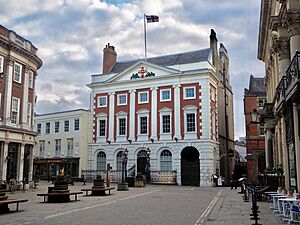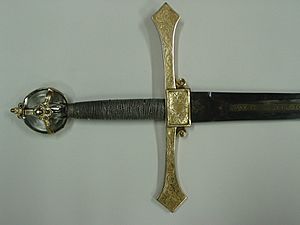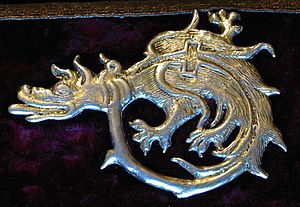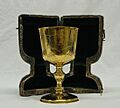Mansion House, York facts for kids
Quick facts for kids Mansion House |
|
|---|---|

The Mansion House at St Helen's Square in York
|
|
| Type | Official residence |
| Location | St Helen's Square, YO1 9QL, York, England |
| Built | 1725–1732 |
| Built for | Lord Mayor of York |
| Original use | Official residence |
| Restored | 2015 |
| Restored by | York Civic Trust |
| Current use | Museum and residence |
| Architect | William Etty |
| Architectural style(s) | Georgian |
| Owner | City of York Council |
| Website | www.mansionhouseyork.com |
|
Listed Building – Grade I
|
|
| Official name: Mansion House, railings and gas lamps attached to front | |
| Designated | 14 June 1954 |
| Reference no. | 1257969 |
| Lua error in Module:Location_map at line 420: attempt to index field 'wikibase' (a nil value). | |
The Mansion House in York, England, is a special building. It serves as the official home and workplace for the Lord Mayors of York. They live here during their time in office. You can find it in St Helen's Square, where two streets, Coney Street and Lendal, meet in the city centre.
This building was designed in an early Georgian style. It is the oldest house built specifically for a Lord Mayor that is still standing today. It was even built about twenty years before the famous Mansion House in London. The first stone for the Mansion House was laid in 1725. The building was finished seven years later, in 1732. We don't know for sure who the main architect was. However, some people believe William Etty designed the front part of the building.
Contents
History of the Mansion House
The Mansion House stands where old "Common Hall Gates" used to be. These gates led to the York Guildhall. Other buildings, like a chapel and the Cross Keys Public House, were also on this spot. These older buildings were taken down in 1724 to make way for the Mansion House.
The York Guildhall is a very old building from the 1400s. It is located right behind the Mansion House. In the past, the city council held their meetings there. Even today, a special event called the "Mayor Making ceremony" happens in the Guildhall every May. After this ceremony, the new Lord Mayor moves into the Mansion House.
Restoring the Mansion House
The Mansion House has been carefully looked after over the years. In 1998, the York Civic Trust helped to restore the house. Later, in October 2015, the Mansion House closed for more updates. This project was called "Opening Doors." It was supported by the Heritage Lottery Fund. The house reopened to visitors in 2017.
The "Opening Doors" project focused on several important things. They restored the old kitchens to how they used to look. They also made the displays better for visitors to enjoy. A big part of the project was taking care of the city's collection of gold and silver items. They also worked on a plan to protect the building itself. Finally, they collected stories from people who knew the house, which is called an oral history project.
Treasures of the Mansion House
The Mansion House is home to one of the largest collections of city silver in England. These amazing items have been on display in a new Silver Gallery since January 2017. Visitors can now see these treasures up close.
The Rawdon Collection
Two of the oldest pieces in the collection are from the 1600s. These are a silver chamber pot and a gold cup. They were bought for the City of York with money left by Marmaduke Rawdon in 1669. Marmaduke wanted to give "one drinking cup of pure gold" worth a lot of money. He also wanted a "silver chamber pott" for the city. He asked for the city's coat of arms and his own family arms to be engraved on them. He wanted these items to be passed down from one Lord Mayor to the next.
The City Swords
The Mansion House also has a collection of special items called civic regalia. This includes a mace from the 1600s and two important city swords.
The Bowes Sword
The Bowes Sword was given to the City of York in 1549. It was a gift from Sir Martin Bowes, who was the Lord Mayor of London in 1545. Sir Martin Bowes was born in York. He was baptized in St Cuthbert's Church, York, where many of his family members were also buried. In the 1500s, there was a plan to reduce the number of churches in York. Sir Martin Bowes asked the council to save St. Cuthbert's.
To thank him for saving the church, Sir Martin sent a letter to York in 1549. He said he was sending "a fayre sworde within a sheathe of crymesyn velvet." This means a beautiful sword in a crimson velvet sheath. It was decorated with pearls and stones set on silver and gold. In 1603, when King James VI of Scotland visited York, the Bowes sword traveled with one of his helpers to London. When the sword came back, the original precious stones were gone. The sword was then repaired with less valuable stones.
The Sigismund Sword
The Sigismund sword once belonged to Sigismund, Holy Roman Emperor. In 1416, Sigismund became a Knight of the Order of the Garter. This was part of an alliance King Henry V made against France. Sigismund sent a sword to be hung in his special place at St George's Chapel, Windsor Castle. The sword was still there when he passed away in 1437.
Later, the sword was acquired by Henry Hanslap. He was a dean at Windsor and also from York. On May 5, 1439, Henry Hanslap gave the sword to the City of York. The blade of the Sigismund sword is blue. It has the Royal Arms of Elizabeth I carved on it. The sword's cover is made of crimson velvet. It is decorated with "scorpions" or dragons. These dragons look like the symbol of the knightly Order of the Dragon. Sigismund himself founded this order in 1408.
Portraits of Past Mayors
The Mansion House also has a collection of oil paintings. These paintings show many of the past Lord Mayors of York. Some of the famous people painted include George IV when he was Prince Regent, Charles Watson-Wentworth, 2nd Marquess of Rockingham, and George Hudson.
Images for kids





